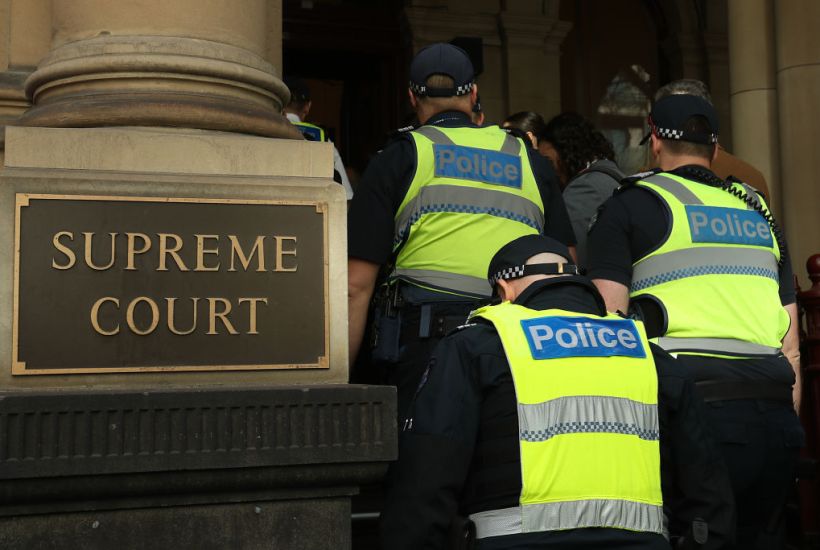It’s not dark yet, but it’s getting there…
Bob Dylan
The decision last week of the Victorian Court to reject the appeal against the conviction of Cardinal Pell for child abuse will be a source of distress to many Catholic Christians.
I have read Louise Milligan’s book Cardinal: the Rise and Fall of George Pell. I cannot accept Ms Milligan’s conclusions in full, perhaps in part because I know Cardinal Pell (not so much as a personal friend but as a familiar acquaintance), and have had professional dealings not only with him but also with several people named in the book whom I regard (against Ms Milligan) as decent and honourable. But there are also factual errors and there is a high degree of tendentious reporting: for example, it is not true to say that the 8.1 per cent of Melbourne clergy who were accused of child abuse were in fact proven abusers. The real figure is much lower. Yes, the figures come from the Royal Commission – but isn’t it the role of an investigative reporter to dissect and analyze? She also applies that figure to an entire period of 60 years (1950-2010), two whole generations, ignoring the fact that offences peaked during the climacteric 1960-70 period, a time when screening for admission to seminaries was manifestly inadequate, or not done at all, and when the sinister nature of paedophilia as a psychological and criminal disposition was poorly understood. The incidence of offending has plummeted (thank God) during the past two decades and more.
Reading the book was, therefore, a painful experience for me but one that I strongly recommend to others. The author defends and vigorously argues a position she genuinely believes in, and I sense that she tries equally genuinely to be fair in reporting contrary views. My first instinct to write it off as a mere hatchet job is one I feel bound to abandon. It deserves more respect than that.
The greatest value of the book to me is that it exposes the detestation that many people, including many of Catholic background, feel towards the Church as an institution. It is imperative that all Christians face up to this fact. Loathing of the Church as an institution often leads to rejection of the Faith it was commissioned to teach. How can a person who has been disgustingly abused, or who has known and spoken to victims of abuse, trust in the doctrines that the institution proclaims? We who believe that God created heaven and earth, that Truth and Beauty are objective realities, that Christ will be our judge, should be devastated by the realization that many people find such beliefs repellent – because of the low character and hypocrisy of some of those who have taught it to them.
To a believing Christian, none of these horrors ought to be surprising. We have been told about ‘original sin’. We have seen evil in every generation and we know that there is wickedness in the world. Christ himself, in his parable of the weeds sown among the wheat, made it perfectly clear that the world (and that includes the Church) is riddled with infection. One day the Judge will sternly sort it out; in the meantime, we must wait and struggle to maintain our Faith and Hope.
On the central issue at this time I do not believe that Cardinal Pell committed the offences for which he was tried and found guilty because I know what a Cathedral sacristy looks like in the moments after a solemn Mass. I accept the minority view that, for a variety of reasons, it would have been a physical impossibility.
But I’m aware that many think, even if they will not say so directly, that the Cardinal deserves to be found guilty because he inadequately dealt with clerical offences that certainly occurred on his watch. That is an entirely different matter and should be treated in other ways. My concern here is with process. Should the word of the victim be accepted against the word of the accused without physical evidence of any kind? Is that the proper role of a court? Is the traditional onus of proof to be substantially shifted? Hard cases make bad law. Although it is instinctive to want to protect the rights of vulnerable people, particularly when they are threatened by those in positions of authority, nevertheless there are and should be ways of offering protection that do not require erosion of the existing safeguards provided by our courts, an erosion of principles which have a wider application.
‘It is better that ten guilty persons escape than that one innocent suffer.’ Thus spoke eighteenth-century jurist William Blackstone. Robert Bolt, in A Man for all Seasons, offers another angle:
Roper: So now you’d give the Devil benefit of law!
More: Yes. What would you do? Cut a great road through the law to get after the Devil?
Roper: I’d cut down every law in England to do that!
More: Oh? And when the last law was down, and the Devil turned round on you — where would you hide, Roper, the laws all being flat? This country’s planted thick with laws from coast to coast — man’s laws, not God’s — and if you cut them down — and you’re just the man to do it — d’you really think you could stand upright in the winds that would blow then? Yes, I’d give the Devil benefit of law, for my own safety’s sake.
Got something to add? Join the discussion and comment below.
Got something to add? Join the discussion and comment below.
Get 10 issues for just $10
Subscribe to The Spectator Australia today for the next 10 magazine issues, plus full online access, for just $10.


























Comments
Don't miss out
Join the conversation with other Spectator Australia readers. Subscribe to leave a comment.
SUBSCRIBEAlready a subscriber? Log in